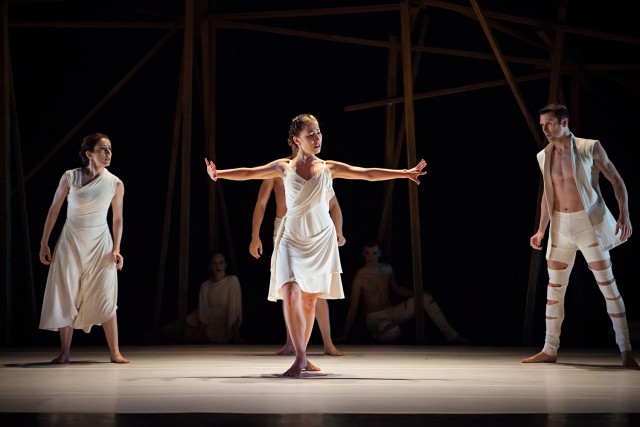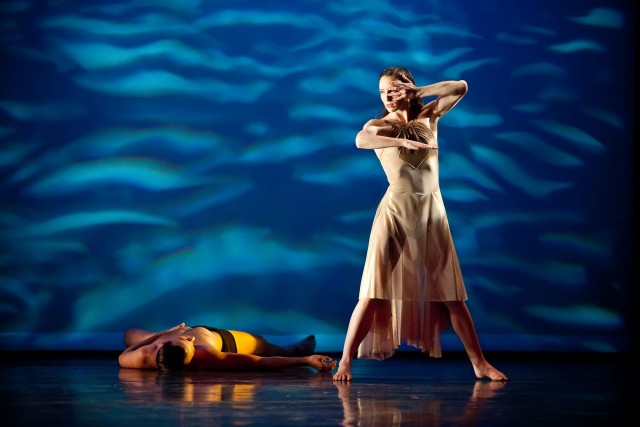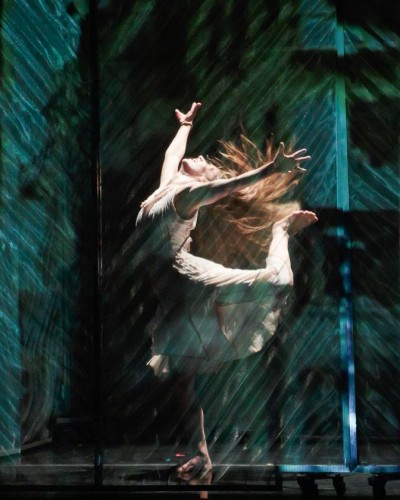
Queen Clytemnestra and King Agamemnon battle over Iphigenia’s fate as part of RIOULT Dance NY’s “Unsung Heroines of the Trojan War” (photo by Sofia Negron)
Joyce Theater
175 Eighth Ave. at 19th St.
June 21-26, $10-$56
212-645-2904
www.joyce.org
www.rioult.org
RIOULT Dance NY kicked off its Joyce season on June 21 with a trio of works focusing on mythological women, as New York City–based French choreographer Pascal Rioult channels his mentor, Martha Graham. The evening began with 2013’s Iphigenia, based on Euripides’ Iphigenia in Aulis. Iphigenia (Catherine Cooch) is in love with Achilles (Jere Hunt), but her father, King Agamemnon (Brian Flynn), is considering sacrificing her to appease a goddess who has prevented the winds from carrying the Greek ships to do battle against Troy. Meanwhile, Iphigenia’s mother, Queen Clytemnestra (Charis Haines), wants to protect her daughter. Michael Torke’s score ranges from noirish jazz to elegant Baroque-style music as the characters, dressed in white (all the men are bare-chested except for Flynn, and their pants are loosely wrapped spirals of fabric; the costumes are by Karen Young), remain within a large white circle in front of a haphazard log structure. (The set is by Harry Feiner, with lighting by Jim French that turns the circle from white to blue to purple to red.) Cooch gives a highly expressive performance as the title character, from a balletic solo to pas de deux with each of her parents to an emotional quartet with Hunt, Haines, and Flynn. The story is narrated by Oscar-nominated actress Kathleen Turner, barefoot and wearing black, her legendary husky voice adding context to the lovely dances.

Charis Haines is Helen of Troy in Pascal Rioult’s emotional ON DISTANT SHORES (photo by Sofia Negron)
Following intermission, Haines is back, this time as Helen of Troy in On Distant Shores . . . a redemption fantasy, dancing among four Trojan War heroes (Flynn, Hunt, Michael Spencer Phillips, and Sabatino A. Verlezza) who at first appear to be dead until she raises them one at a time, she in a flowing white dress, the men in tight black shorts. (The costumes are by Pilar Limosner.) As projections on the back wall shift from heavenly clouds to ominous darkness, Haines moves swiftly in between and around the men to Aaron Jay Kernis’s cinematic score. At one point she kneels on the floor in desperation, as if resigned to her fate, but her warriors stand by her, determined to fight for her.

RIOULT Dance NY presents world premiere of CASSANDRA’S CURSE at the Joyce (photo by Eric Bandiero)
The splendid night of antiwar statements concludes with the world premiere of Cassandra’s Curse, inspired by Euripides’ The Trojan Women. Sara Elizabeth Seger is Cassandra, the Trojan prophetess who has been cursed so that no one will believe her prophecies. She is trying to warn everyone that the Greek army is hiding within a large Trojan horse, but they are not listening. “If she had used a thousand words, no one would have believed her,” Turner narrates. Feiner’s set features a series of movable screens that entrap Seger in a cage as Brian Clifford Beasley’s projections of the horse and Turks unspool behind her. Richard Danielpour’s dramatic score is performed live by the Uptown Philharmonic, conducted by Kyle Ritenauer and consisting of four violinists, two violists, and a cellist. The three pieces work together extremely well, a kind of clarion call, through movement, music, and text, for peace in these difficult times. Rioult is also presenting a second program that includes the New York City premiere of 2015’s Polymorphous, 2014’s Dream Suite, 2002’s Bolero, and a selection of duets from various other repertory works. (The June 23 show will be followed by a Curtain Chat with members of the company.)